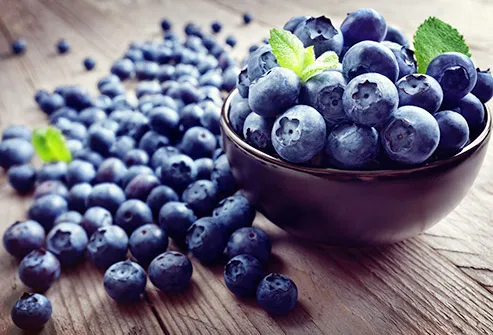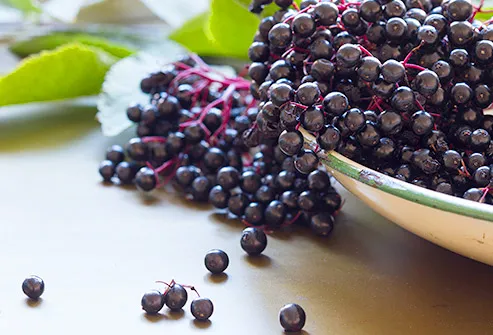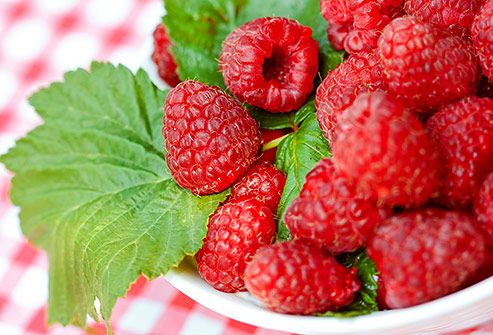Τα μούρα είναι ένας ευρύτερος όρος, τον οποίο
χρησιμοποιούμε για να αναφερθούμε στα βατόμουρα, τα σμέουρα, τα μύρτιλα,
τις φράουλες, τα κράνμπερι, τα φραμπουάζ, τα μαύρα, μπλε, κόκκινα και
λευκά μούρα.
Τα μούρα είναι πλούσια σε θρεπτικά συστατικά, ενώ δεν δίνουν θερμίδες, υδατάνθρακες και λιπαρά. Είναι επίσης πλούσια σε αντιοξειδωτικά,
τα οποία σύμφωνα με επιδημιολογικές μελέτες, προστατεύουν από
καρδιαγγειακά και πολλές μορφές καρκίνου. Γι’ αυτό και τα μούρα
περιλαμβάνονται στην κατηγορία των υπερτροφών.
Ειδικότερα, τα μούρα είναι πλούσια στις εξής θρεπτικές ουσίες:
Ανθοκυανίνες: Είναι οι χρωστικές ουσίες που
ευθύνονται για το έντονο χρώμα των μούρων και βρίσκονται σε μεγαλύτερες
συγκεντρώσεις στα μαύρα και τα μπλε μούρα. Είναι ισχυρά αντιοξειδωτικά
και προστατεύουν από καρδιαγγειακά νοσήματα και καρκίνο, καθώς έχουν
αντιφλεγμονώδη, αγγειοπροστατευτική και υπογλυκαιμική δράση.
Κηκιδικό οξύ: Πρόκειται για αντιοξειδωτικό που
προστατεύει το δέρμα από την υπεριώδη ακτινοβολία και εξουδετερώνει τη
δράση των καρκινικών κυττάρων, εμποδίζοντας την ανάπτυξη όγκων.
Καροτενοειδή: Μπλοκάρουν τις ελεύθερες ρίζες, αποτρέπουν την πρόωρη γήρανση και ενισχύουν το ανοσοποιητικό.
Φυτοοιστρογόνα: Έχουν ήπια δράση που μοιάζει με
αυτήν των οιστρογόνων που εκκρίνει ο γυναικείος οργανισμός. Περιορίζουν
τον κίνδυνο θρομβώσεων, εγκεφαλικών, καρδιακών αρρυθμιών, μειώνουν τη
χοληστερίνη και τα τριγλυκερίδια και ρυθμίζουν την αρτηριακή πίεση.
Μέταλλα και ιχνοστοιχεία: Τα μούρα είναι καλές πηγές
σιδήρου, ασβεστίου, μαγνησίου, φωσφόρου, καλίου και σεληνίου. Η
παρουσία τους σε επαρκείς ποσότητες στον οργανισμό είναι καθοριστική για
πολλές ζωτικές λειτουργίες.
Έρευνες έχουν καταλήξει στο συμπέρασμα ότι οι ανθοκυανίνες των μούρων προστατεύουν την καρδιά και μειώνουν τον κίνδυνο εμφράγματος στις γυναίκες.
Επιστήμονες από το Πανεπιστήμιο Χάρβαρντ, διαπίστωσαν ότι οι γυναίκες
που έτρωγαν τις περισσότερες ανθοκυανίνες είχαν κατά 32% λιγότερες
πιθανότητες να πάθουν έμφραγμα.
Ειδικοί του Πολιτειακού Πανεπιστημίου του Οχάιο κατέληξαν στο συμπέρασμα ότι τα μαύρα μούρα αποτρέπουν την εμφάνιση κακοήθειας στη στοματική κοιλότητα, τον οισοφάγο και το παχύ έντερο.
Τέλος, έρευνες του αμερικανικού ερευνητικού κέντρου για τον καρκίνο
του μαστού «James Graham Brown» αναδεικνύουν τη δράση των μαύρων μούρων
κατά του καρκίνου των πνευμόνων.
Ο σίδηρος που περιέχουν τα μπλε μούρα προστατεύει από διάφορες παθήσεις του εντέρου, όπως η ελκώδης κολίτιδα.
Έρευνα της Iατρικής Σχολής του Πανεπιστημίου Χάρβαρντ σε ηλικιωμένες
γυναίκες, που έπιναν 1-2 ποτήρια χυμό κράνμπερι καθημερινά για 6 μήνες,
απέδειξε ότι ο αριθμός των βακτηριδίων στην ουροδόχο κύστη τους
περιορίστηκε και, επιπλέον, είχαν σχεδόν 60% λιγότερες πιθανότητες να παρουσιάσουν λοιμώξεις στην περιοχή.
Στα οφέλη των μούρων συγκαταλέγεται τέλος η προστασία της μνήμης.
Blueberries
The deep blue of
these berries does more than make a pretty pie. The color comes from
potent compounds called anthocyanins. Scientists think these
antioxidants may help protect you from cancer, heart disease, and
dementia, and boost your immune system. But we need more research to
know for sure. Eat these juicy gems fresh or frozen. They have water and
fiber, which fill you up without wrecking your diet. A half-cup has
about 40 calories.
Acai Berries
These grape-like
fruits (pronounced “ah-sigh-EE”) are often called a superfood, because
they may have more antioxidants than other berries. Those nutrients can
stop cell damage that can lead to many diseases. Still, more research
will help us know how much they can help. Enjoy fresh or frozen acai
berries, but check with your doctor before you take them as supplements.
Large doses can be harmful and may affect how some medicines work.
Avocado
Surprise! Avocados
are single-seeded berries. Their soft green flesh is loaded with
vitamins, minerals, and healthy fats. Avocados can help your heart,
support weight loss, and may keep you healthy as you get older. Slice
and add to salads, blend into smoothies, or spread onto sandwiches
instead of mayonnaise. Just don’t overdo it. One serving is 1/5 of an
avocado.
Blackberries
Blackberries have a
lot of polyphenols, chemicals that may cut inflammation that leads to
heart disease and cancer. The berries may also help your small intestine
break down sugar better, which could lower your odds of type 2
diabetes. Eat them fresh or frozen if you can. A cup of plain
blackberries has 7 grams of sugar. The same amount canned in heavy syrup
has over 50 grams. Boysenberries and marionberries are types of
blackberries.
Strawberries
These sweet,
heart-shaped fruits are full of vitamin C, folic acid, fiber, and
antioxidants. They may help lower high blood pressure and cholesterol,
help you manage blood sugar, and fight the effects of aging on your
brain. Since strawberries spoil quickly, buy them often. To reap the
most health benefits, don’t wash or hull them until you’re ready to eat
and enjoy.
Goji Berries
Sometimes called
wolfberries, they've been part of Chinese medicine for thousands of
years. They have vitamins (C, B2, and A), iron, and antioxidants.
Scientists have looked for proof that they boost immunity, fight heart
disease, help the brain, aid digestion, and prevent cancer, but so far,
they don't know for sure. Only eat them ripe. Unripe ones can be toxic.
And don’t eat them if you’re pregnant, nursing, or taking blood
thinners.
Cranberries
If you tend to get
urinary tract infections, you may have downed cranberry juice. It won’t
treat UTIs, but cranberry supplements may cut your odds of getting them
later. The berries may make it less likely bacteria will stay in your
stomach and cause infections. Scientists are studying if they can
prevent cancer and boost heart health. Watch how much of the juice you
drink: Too much may upset your stomach and lead to kidney stones.
Aronia berries
These dark purple
berries, also known as chokeberries, are high in vitamins, minerals, and
nutrients. Because of that, researchers are checking into whether they
can help prevent cervical, skin, breast, and colon cancers. Scientists
are also studying if aronia berries could help fight liver and heart
disease and even obesity. Look for them fresh or frozen at the store.
You can also sip aronia-infused tea.
Elderberries
For hundreds of
years, people used them to fight colds and flu. A few studies suggest
that their extract may shorten flu symptoms if you take them in the
first day or two. Only eat cooked elderberries -- raw ones or their
leaves can make you sick. Also, women who are pregnant or breastfeeding
or anyone with immune system problems shouldn’t have the berries at all.
Don’t use them if you take diabetes medicines, diuretics, or laxatives.
Red Raspberries
As far back as A.D.
4, parts of raspberry plants were used to treat morning sickness and
stomach pain. Now we know the berries themselves have power. Raspberries
are loaded with nutrients that may help fight different types of cancer
and others that may protect your brain. Although you can find some of
these same substances in diet supplements, treat yourself to fresh
raspberries. They’ll give you the most benefits.
Cloudberries
A 2/3-cup serving
of these peach-colored berries has twice the vitamin C of a glass of
orange juice. They’re also rich in antioxidants, which is one reason
you’ll find them as an ingredient in some skin care products. It’s best
to eat the berries the same day they’re picked, but you can also freeze
them for up to 2 years.
Kiwiberries
You probably know
their fuzzy, egg-shaped cousin, the kiwi fruit. These grape-sized
berries are about the same in taste and nutrition. They have lutein,
which helps protect your eyes; zinc for healthy skin, hair and nails;
and potassium, which helps you get a better workout. Since their skin is
fuzz-free, they’re easy to pop into your mouth for a quick, sweet
snack.
Bilberries (Huckleberries)
These berries have
long been thought to improve vision. (World War II pilots ate bilberry
jam in hopes of making their night vision better.) While their extract
may help prevent eye problems like macular degeneration and cataracts,
we need more research to know for sure. Ask your doctor before you take
bilberry extracts or supplements. But enjoy the sweet-tart flavor of
fresh ones in late summer and early fall.
Ginseng Berries
In Chinese
medicine, the root of the ginseng plant is a common treatment. But what
about its berries? Studies of mice showed they may be able to lower
cholesterol, fight cancer, and lower gut inflammation. If you have
diabetes, there’s some evidence that ginseng berry juice could help you
control your blood sugar and weight. Look for ginseng berry extract in
skin products, too. It may help fight skin damage and the effects of
aging.
Gooseberries
These fruits can be
light green, pink, or red when they get ripe. In India, one type, amla,
has long been used to treat colds and fever, help digest food, and as
hair tonic. Now, some evidence suggests these berries could help fight
cancer, boost liver health, prevent osteoporosis, and treat parasites
and infections. But scientists need to do more research. Enjoy them
fresh or cooked, but ask your doctor before you start a supplement.
SOURCES :WebMD , ONMED.GR etc
















Δεν υπάρχουν σχόλια:
Δημοσίευση σχολίου